There’s a reason night shifts are romanticized in dramas and villain origin stories: they turn functioning adults into sleep-deprived cryptids who fear clipboards more than actual emergencies.
You’re not just tired.
You’re hormonally betrayed, emotionally hollowed, and one hallway whisper away from snapping.
If you’ve ever tried to nap on a hospital cot only to be jolted awake like you’re in a horror movie—you already know:
night shifts aren’t just bad for you—they’re slowly dismantling your humanity.
Table of Contents
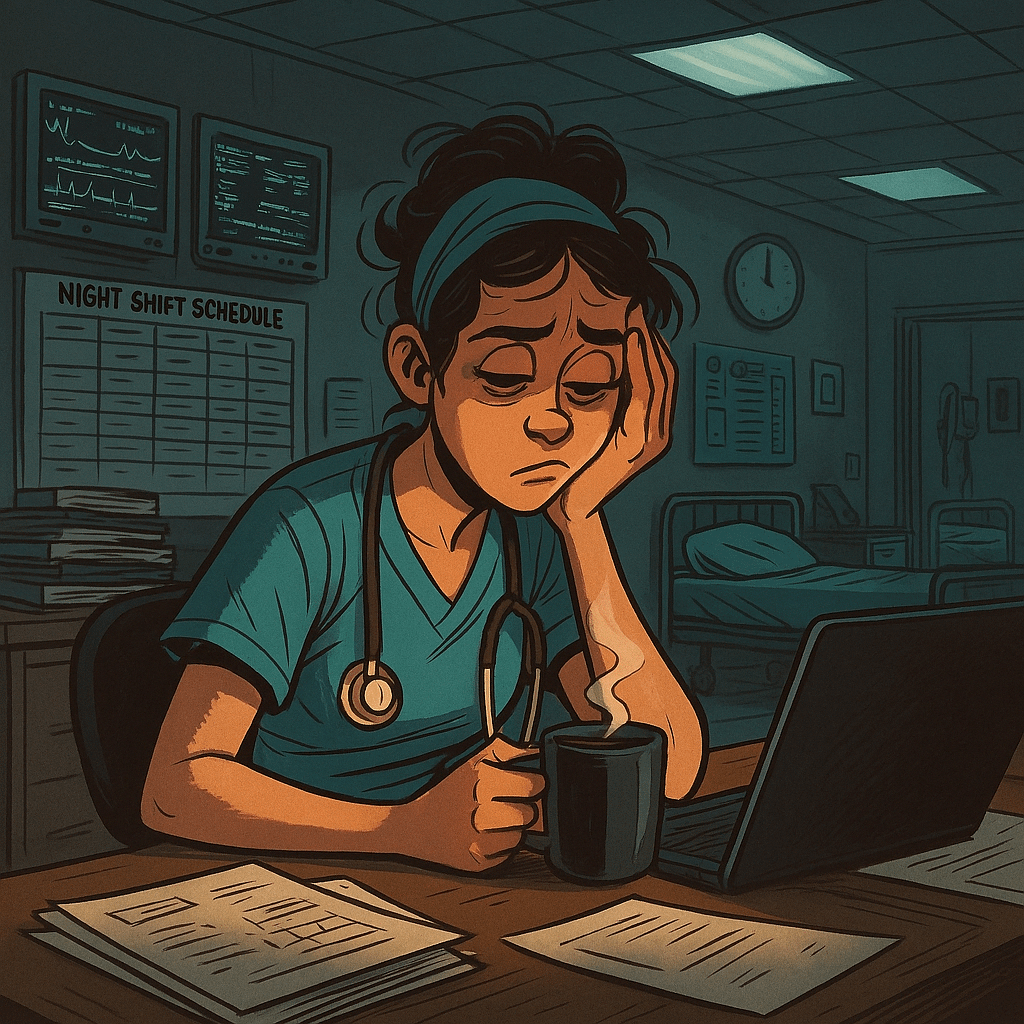
If you still need convincing why night shift is bad for you, read about the emotional collapse I endured during a so-called “15-minute” lunch break.
Let’s get one thing straight: there’s a reason people keep Googling why night shift is bad for you.
It’s not just the sleep deprivation. It’s the full-body betrayal. The cognitive malfunction. The psychological unpeeling of your will to live.
Not “a little hard,” not “something you’ll get used to.”
They’re a full-on physiological betrayal.
Your circadian rhythm? Obliterated.
Your serotonin? Confused and possibly filing for resignation.
Your REM sleep? LOL. No.
And it’s not just the sleep deprivation or the cortisol spike that comes from hearing “Doctor, do you have a second?” at 3:04 AM.
It’s the wake-up calls.
The horrible, sudden, personality-erasing ways you’re pulled from your 11-minute nap like a cursed Disney princess being kissed by a clipboard instead of a prince.
So today, we’re not just talking about why night shifts are bad for you—we’re ranking the worst ways to be woken up mid-shift.
Because if we’re going to suffer, we might as well categorize it.
Disclaimer:
This article was written in the aftermath of a real night shift.
I’ve had 46 minutes of broken sleep, three sips of lukewarm coffee, and the emotional stability of a dropped thermometer.
Any sarcasm, bitterness, or unhinged medical metaphors are completely intentional—and also deeply personal.
The Real Reasons Why Night Shift Is Bad for You (Ranked by Emotional Damage)
1. The Code Blue Siren from Hell
There is no alarm more effective—or more traumatizing—than the Code Blue siren at 3:07 AM.
It doesn’t just wake you up.
It rips your soul from your body, drop-kicks it into the fluorescent hallway, and dares you to function before your brain has even finished buffering.
You were sleeping for exactly 11 minutes.
You dreamed of a vacation. Or death.
Then came the noise.
Suddenly, you’re upright, pants halfway on, stethoscope wrapped around your foot like a serpent, running toward chaos with the accuracy of a drunk GPS.
Your body is moving, but your consciousness is still in 1996.
You don’t know what floor you’re on.
You don’t know your name.
You just know that something is coding and you were the unlucky soul closest to the call button.
Why this is the worst:
- Instant cardiac activation (yours, not the patient’s)
- Adrenaline peak = guaranteed crash in 9 minutes
- You will hallucinate for the next 6 hours
- No one will thank you. Someone will still ask why you’re “breathing so loud”
Damage level:
9.8/10 – Requires caffeine, deep breathing, and one full day of post-shift disassociation.
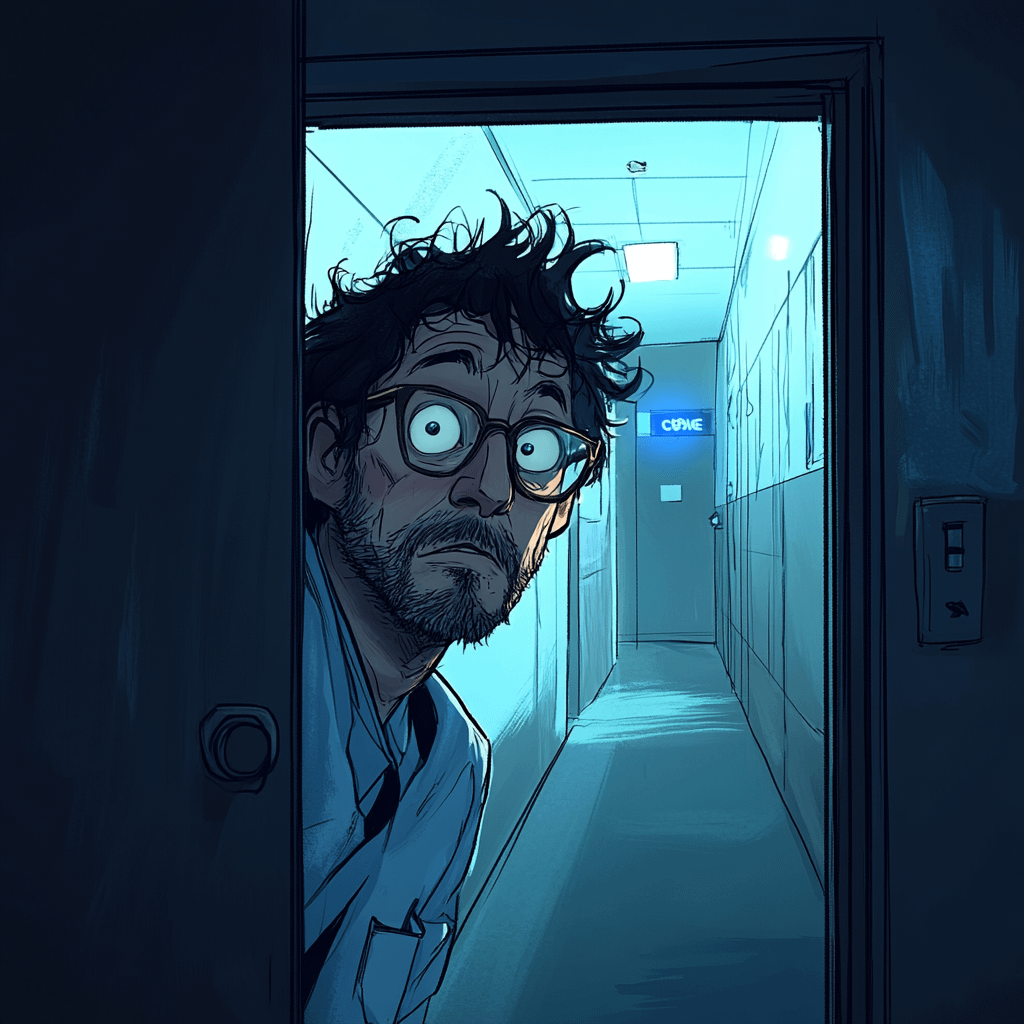
And if you think you’ve heard it all, wait until you see what the night shift actually said—another solid reason why night shift is bad for you, documented with receipts.
2. The Clipboard Ghost
She doesn’t knock.
She doesn’t speak.
She just… appears.
You wake up to the silhouette of a human standing quietly by your cot, holding a clipboard like it’s a weapon and whispering,
“Hey… sorry to wake you, can I just get a quick signature?”
Your fight-or-flight kicks in, but neither works because your limbs are Jell-O and your soul is still somewhere under the blanket.
You sign the form.
You don’t know what it says.
You might’ve accidentally transferred a patient, agreed to night float again, or adopted someone’s intern.
Why this is terrifying:
- It’s always something that could’ve waited 6 hours
- They pretend you’re the one being dramatic
- Your handwriting looks like a dying ECG strip
- They disappear as silently as they came, leaving you with the existential dread of what did I just authorize?
Damage level:
8.6/10 – Mild myocardial infarction + 3% chance of accidentally signing your own organ donation form.
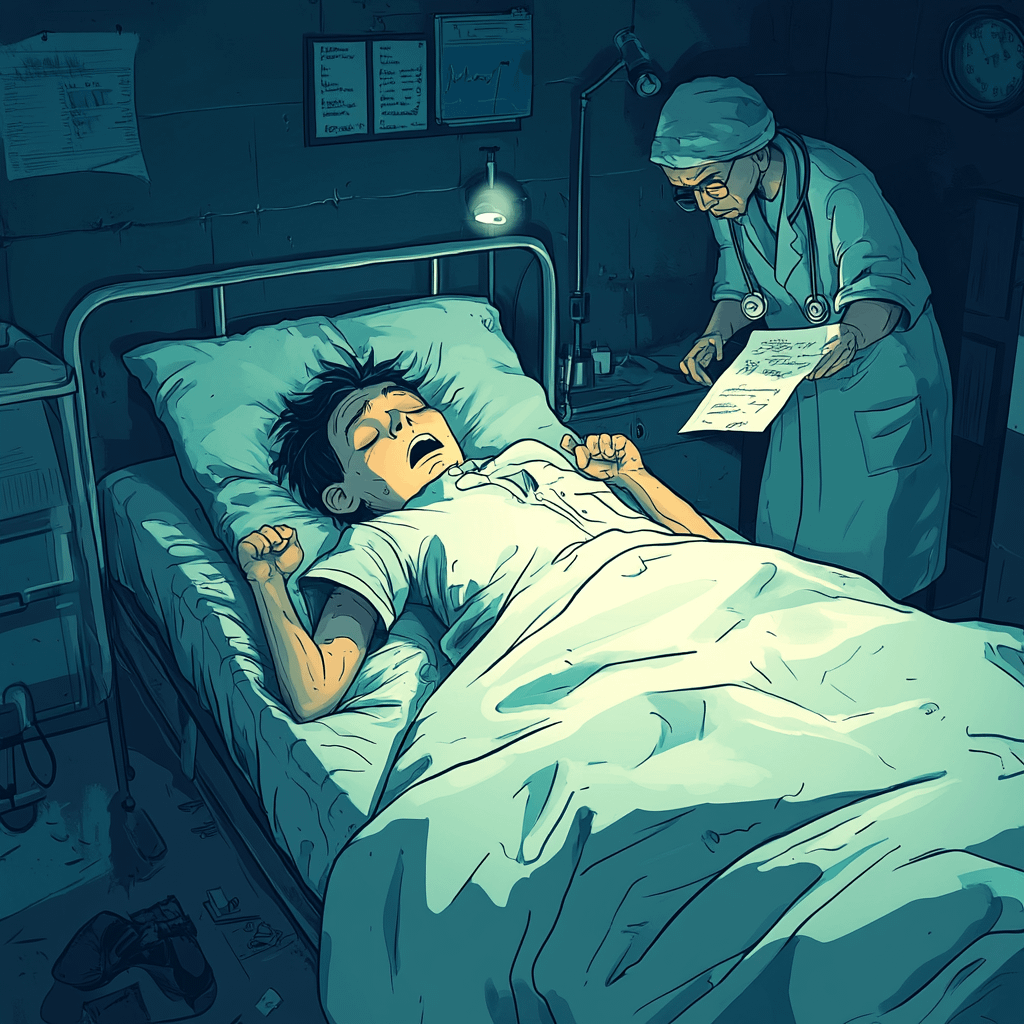
For a slightly more hopeful take on why night shift is bad for you (and how to survive it without losing your will to live), check out this practical guide disguised as a coping mechanism.
3. The Hallway Screamer (a.k.a. Your Circadian Assassin)
You’re mid-shift, deep in the only rest you’ve had since that one nap in med school back in 2009.
You’re unconscious. You’re peaceful.
You’ve left your body and are hovering somewhere near the ceiling fan, dreaming of a world where people use pagers properly.
And then—
“DOCTOR!! DOCTORRRR!!!”
No name. No room number. No context.
Just raw, unfiltered auditory violence.
Your nervous system doesn’t gently wake.
It detaches.
You shoot upright like a Victorian child having a fever dream.
You trip over your own stethoscope. You don’t know if you’re on call or if you just got drafted into war.
By the time you get to the source of the screaming, you’ve passed through all five stages of grief and at least three alternate timelines.
What was the emergency?
Mr.Flatliner had gas.
Someone’s IV beeped once.
Or—better yet—someone needed a paracetamol and “didn’t want to bother the nurse.”
Why this is scientifically proof why night shift is bad for you:
- Involuntary full-body reboot
- Loss of basic language for 7–12 minutes
- Spiritual trauma that lingers in the drywall
- You’ll never trust hallway silence again
Damage level:
9.7/10 – Long-term PTSD. May flinch anytime someone speaks above a whisper. Will definitely start carrying earplugs and holy water.
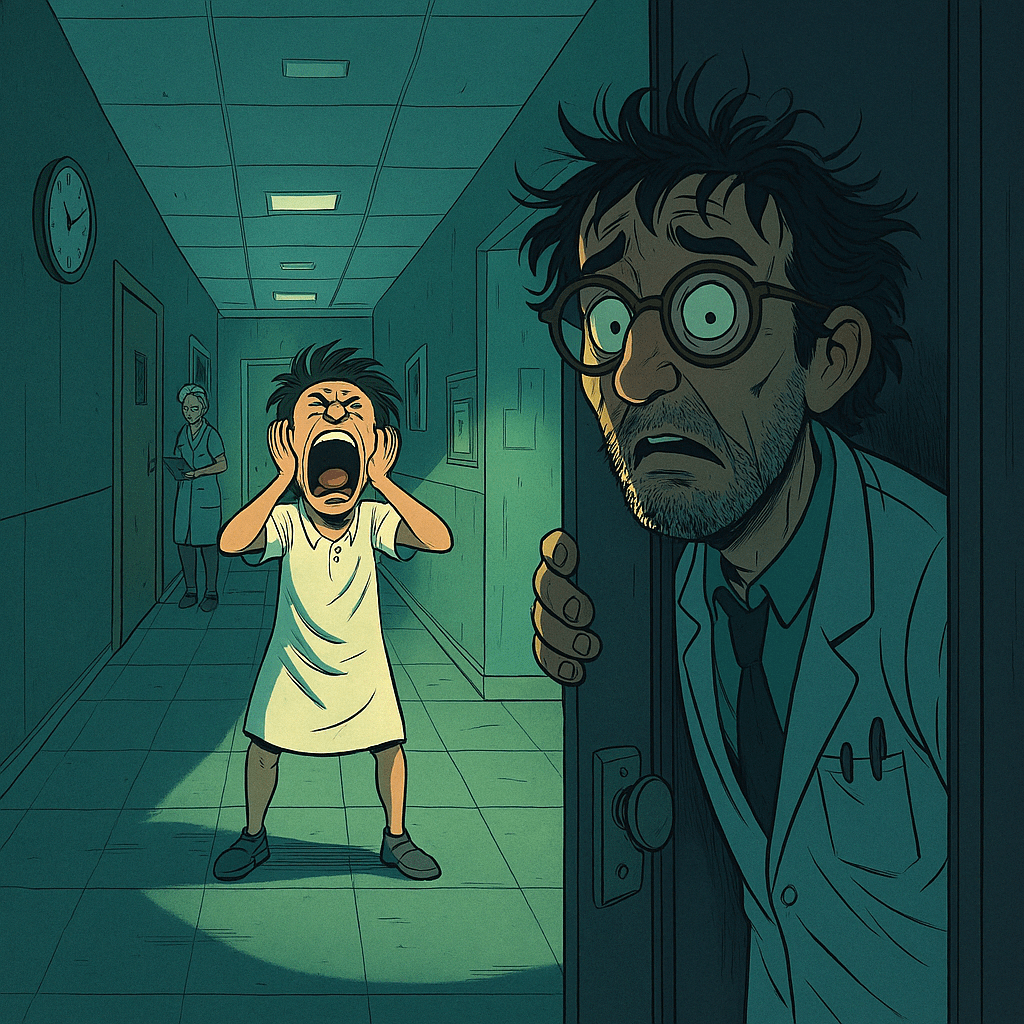
If you need a break from remembering why night shift is bad for you, take a detour into the absurd with these funny medical condition names we desperately wish were real.
4. The Friendly Nurse With Devastating News™
You’re deep in REM. Your first REM in 36 hours. The kind of sleep that flirts with healing.
Then—
tap tap tap
“Sorry to wake you…”
You open your eyes. Blurred ceiling. Spinal stiffness. A vague awareness that you were once a person with dreams.
The nurse smiles gently, like she’s about to tell you your pet goldfish has been rehomed.
Then comes the line that proves why night shift is bad for you:
“Room 12 said they feel weird. Just thought you should know.”
You sit up. You consider your life choices. You remember none of them led to being paid enough for this.
You ask, “Vitals?”
She shrugs. “Normal.”
You ask, “O2?”
“Perfect.”
You ask, “What do you want me to do?”
She smiles again. “I dunno. Just felt off.”
And that’s when you remember—
This is exactly why night shift is bad for you.
Because you’ll spend the next 17 minutes pretending to assess a stable patient while your frontal lobe slowly commits seppuku.
Why this makes the list:
- Destroys your one precious moment of sleep
- No clinical reason, just vibes
- You now look unwell enough for the patient to ask you if you’re okay
- You won’t fall back asleep until your next reincarnation
Damage level:
8.9/10 – Gentle awakening, maximum psychic damage. May result in spontaneous eye twitching and whispered swearing into your badge.
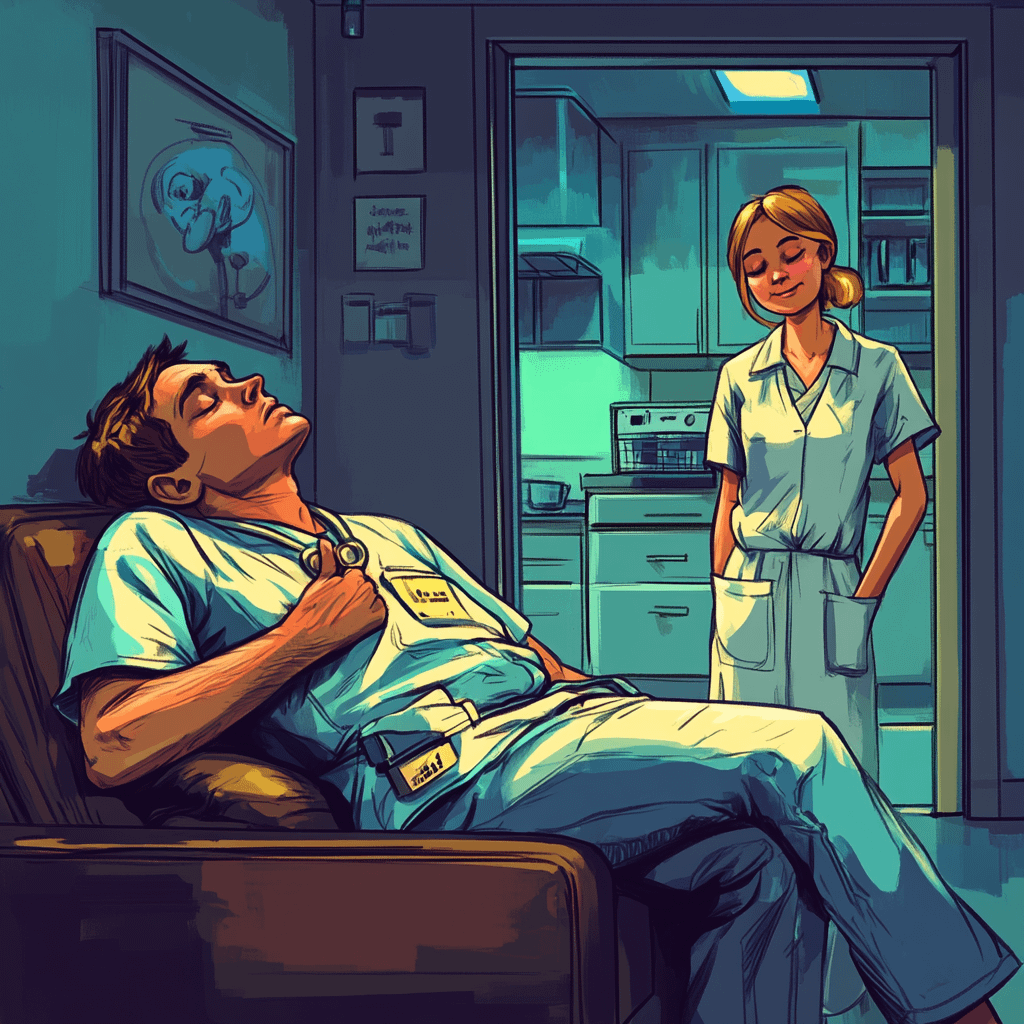
5. Dreaming You Have Sleep Paralysis… While on Night Shift
You finally collapse. Somewhere between a chair that smells like expired toner and a couch that might actually be a repurposed morgue gurney. Your spine files a formal complaint. Your eyelids shut like the automatic doors in OR — slow, reluctant, dramatic.
And then, of course, you dream.
Not of Paris. Not of your childhood dog. No.
You dream you’re on the same night shift.
Except worse.
Because now, you can’t move.
You’re trapped in your body — eyes wide, lungs heavy, limbs useless. Hovering above you is a ghostly silhouette in scrubs, whispering:
“Doctor… I just need a quick signature…”
Your soul tries to scream. Your body says, “Nah.”
Instead, you silently sob in Helvetica.
Even REM cycles won’t respect your license anymore.
You wake up in a panic.
Did you sign something?
Were you… on-call in the dream too?
Your mouth is dry.
Room 8 still has heartburn.
And someone definitely paged you for paracetamol.
Welcome back.
Sleep paralysis: the only place where the bureaucracy haunts you harder than the ghosts.
Damage level:
17/10 – You were asleep. You still didn’t rest. Now your dreams need a vacation.
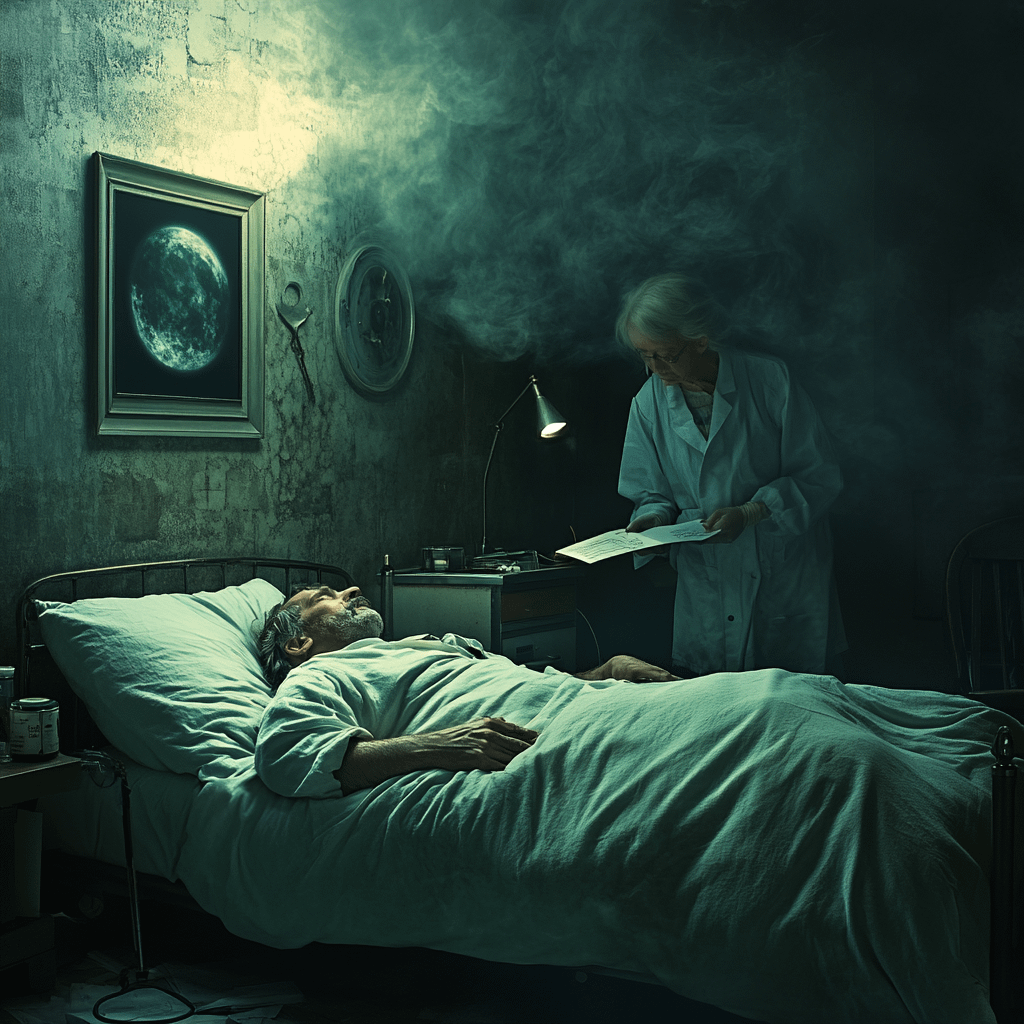
Still wondering why night shift is bad for you? Start with doctor burnout—because chronic exhaustion, emotional numbness, and forgetting your own name are just the opening act.
And if all of that hasn’t fully convinced you why night shift is bad for you, let’s take it a step further.
Because not only are you suffering—you’re being woken up mid-suffering.
With no warning. No mercy. And usually for something that isn’t remotely urgent.
So we made a quiz.
A helpful little diagnostic tool to determine just how emotionally compromised you are after being jolted awake like a haunted toaster.
Go ahead—take the quiz.
Find out which type of sleep-deprived husk you become when your “rest” is interrupted by sirens, forms, and vague complaints about feeling “weird.”
Why Night Shift Is Bad for You, According to This Extremely Scientific Quiz
Because when your dreams start featuring clipboard requests and your nap is interrupted by someone whispering “vitals are fine, but he looks… off,”
it’s time for a little self-assessment.
If you’ve ever been woken up mid-night shift and wondered if your body is aging in dog years, this quiz is for you.
It’s not based on research. It’s based on rage, exhaustion, and the collective trauma of being gently shaken awake for a non-urgent meds.
Take it.
Not for insight—just for validation.
Share your results in the comments!
Worst Way to Be Woken Up During a Night Shift: The Quiz
Why night shift is bad for you, in case the cortisol levels and snack wrappers didn’t make it obvious.
So, if you were still wondering why night shift is bad for you, here’s your answer:
It messes with your body, your brain, your sense of time, and your ability to feel joy when someone says, “It’ll be a quiet shift.”
And if you’re lucky, you’ll only hallucinate once before sunrise.
Welcome to the dark side. We have coffee. And unresolved emotional tension.
Now that you understand why night shift is bad for you, the next logical step is retail therapy.
We recommend something soft, something sarcastic, and possibly something you can throw at the wall at 4 AM.
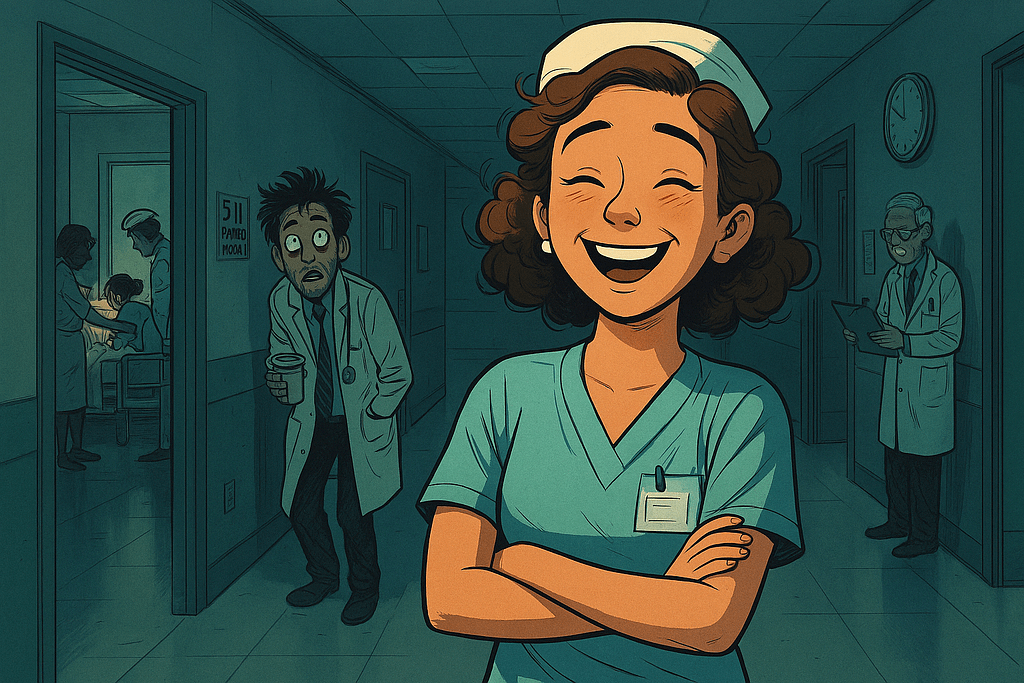
In Case You Still Need Closure
You made it to the end.
Which means you either just survived a night shift… or you’re procrastinating before one.
Either way, congratulations.
You’ve now experienced the full diagnostic breakdown of why night shift is bad for you, complete with horror, hallucination, and just enough humor to pass as emotionally stable.
Was this post helpful?
No.
Was it accurate?
Disturbingly.
Share it with a colleague. Print it and hang it in the break room. Whisper it to your future self the next time someone says, “It’s usually quiet at night.”
And don’t forget to hydrate, caffeinate, and scream into the supply closet if needed.
We’ll be here. Waiting. Plotting socks.
